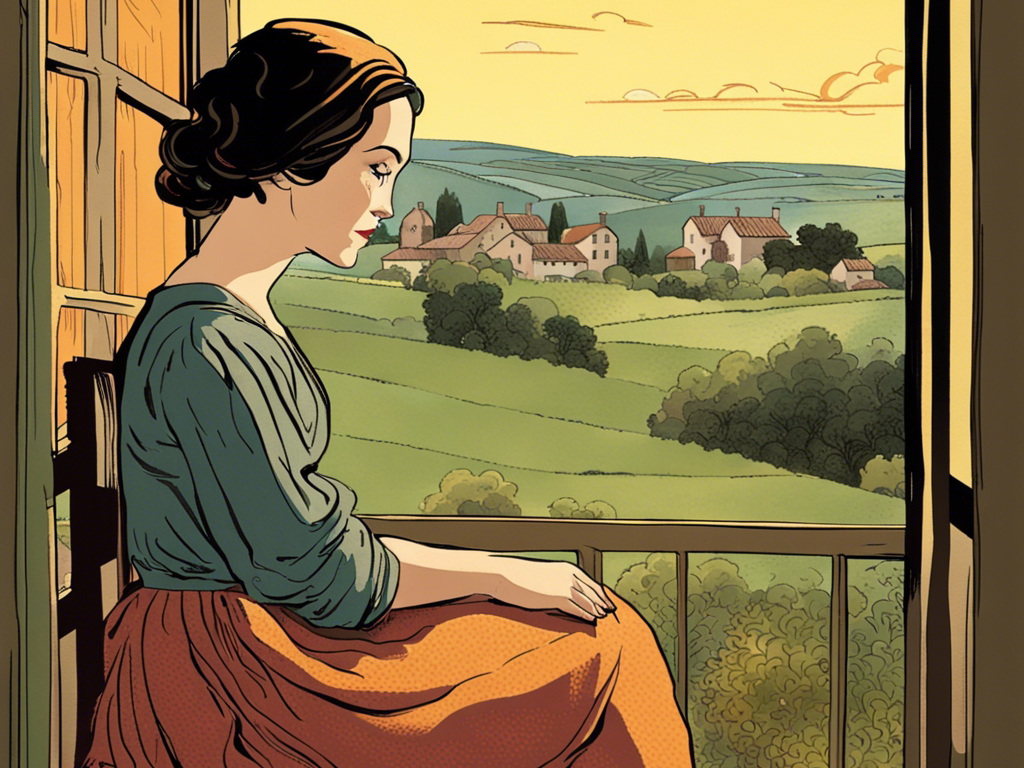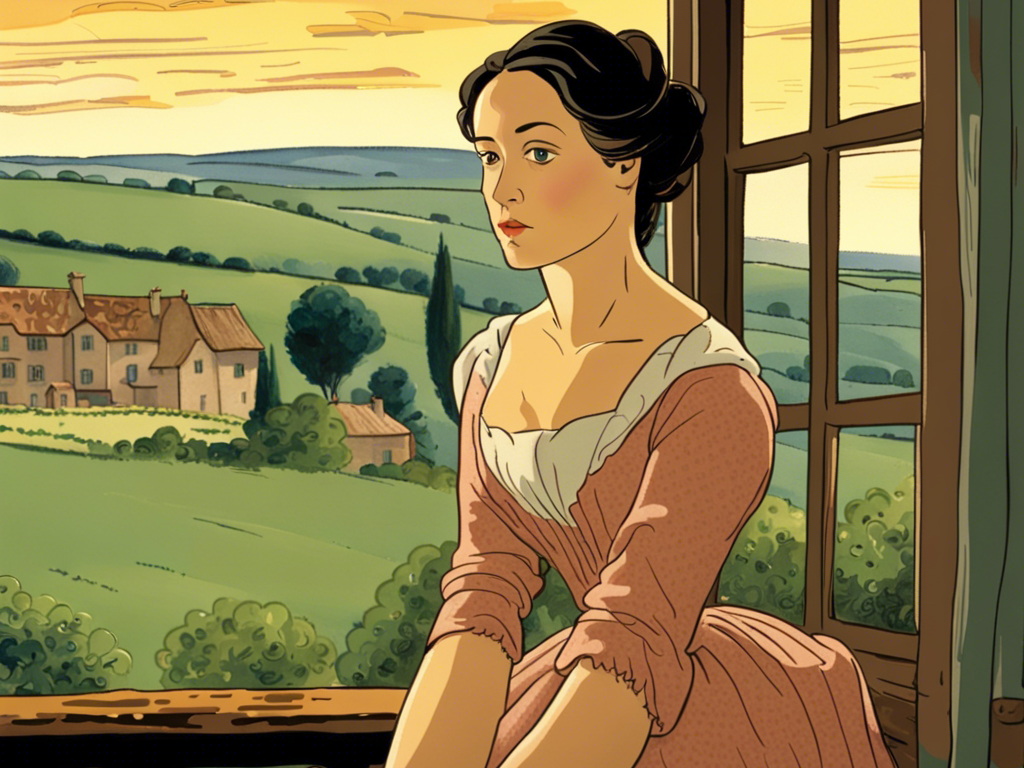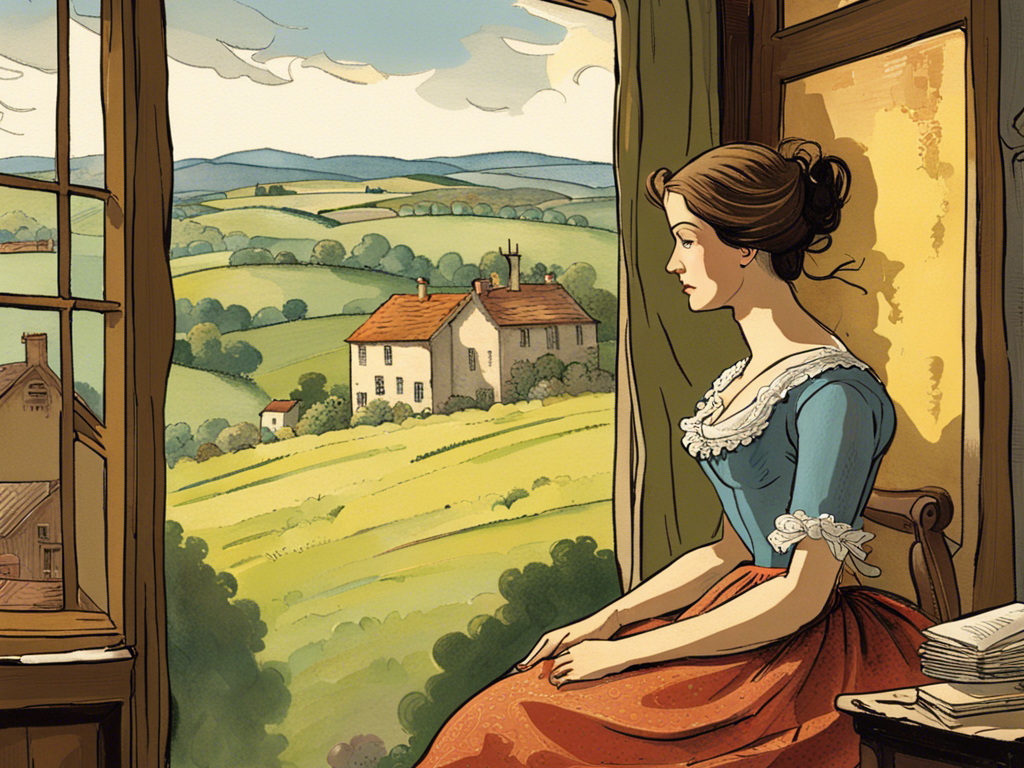Madame Bovary: A Tale of Romantic Desires and Tragic Consequences
Madame Bovary is a tragic novel that explores the life of Emma Bovary who trapped in a loveless marriage and want to seek escapism through extravagant fantasies and ultimately faces the consequences of her actions.
Chapter 1 What’s the Book Madame Bovary about
Madame Bovary is a novel written by the French author Gustave Flaubert. It was first published in 1856 and is considered one of the greatest works of realist fiction. The story revolves around Emma Bovary, who is trapped in a dull and unsatisfying marriage to Charles Bovary, a country doctor. Seeking escape from her mundane existence, Emma embarks on a series of extravagant romantic affairs and indulges in materialistic desires. However, her pursuit of passion and excitement leads to devastating consequences for herself and those around her. Madame Bovary explores themes such as love, desire, social conformity, and the consequences of unchecked romantic fantasy. Flaubert's detailed prose and vivid depiction of Emma's inner life have made the novel a classic of world literature.
Chapter 2 Is Madame Bovary A Good Book
Madame Bovary is widely regarded as a masterpiece of 19th-century literature and has had a significant impact on the literary world. Its author, Gustave Flaubert, is celebrated for his meticulous writing style and attention to detail. The novel delves into themes like love, passion, societal constraints, and the consequences of unfulfilled desires.
However, whether or not someone considers Madame Bovary a "good" book can be subjective, as individual tastes and preferences vary. Some readers appreciate its rich prose, complex characters, and exploration of human nature, finding it thought-provoking and emotionally resonant. Others might find the story slow-paced or overly descriptive, which can make the reading experience less enjoyable for them.
Ultimately, it is up to each reader to decide whether Madame Bovary is a good book based on their personal interests and literary preferences. It is worth noting that the novel's enduring legacy and critical acclaim suggest that it is considered a significant work of literature by many.
Chapter 3 Madame Bovary Synopsis
In this article, explore the captivating world of Gustave Flaubert's iconic novel, "Madame Bovary." Delve into the intricate story of Emma Bovary, a young woman trapped in a suffocating marriage, as she embarks on a relentless pursuit of passion and escape from her monotonous life. Witness the tragic consequences that unfold when Emma succumbs to her insatiable desires, blurring the boundaries between reality and fantasy. Through an analysis of themes such as love, societal constraints, and the perils of idealism, this article unravels the timeless allure and cautionary tale of "Madame Bovary."
Chapter 4 Madame Bovary’s Author
The author of the book "Madame Bovary" is Gustave Flaubert. He released the novel in 1856. Flaubert was a French writer who is considered one of the most influential novelists in Western literature.
Besides "Madame Bovary," Flaubert wrote several other noteworthy works. One of his famous novels is "Sentimental Education" (French: "L'Éducation sentimentale"), published in 1869. It portrays the life of a young man named Frédéric Moreau and explores themes of love, idealism, and social change.
Another significant work by Flaubert is "The Temptation of Saint Anthony" (French: "La Tentation de Saint Antoine"), which he completed in 1874. This novel delves into the inner struggles of Saint Anthony as he combats various temptations presented by demons.
As for the best edition of Flaubert's works, it depends on personal preference and the specific translations available. However, notable English translations of "Madame Bovary" include those by Lydia Davis and Eleanor Marx Aveling. For other works like "Sentimental Education" and "The Temptation of Saint Anthony," various publishers have released editions with different translations and critical introductions to choose from based on individual preferences.
Chapter 5 The Main Characters of Madame Bovary
Madame Bovary, written by Gustave Flaubert, features several significant characters who play important roles in the story. Here are some of the key characters:
- Emma Bovary: The titular character, Emma is a young woman trapped in an unhappy marriage with Charles Bovary. She is dissatisfied with her mundane life and seeks escape through romantic fantasies and affairs. Emma is depicted as a complex and tragic figure, longing for passion and excitement but ultimately descending into despair.
- Charles Bovary:Emma's husband, Charles is a simple-minded country doctor who adores his wife. He is portrayed as a well-meaning but naive and somewhat dull individual. Charles fails to understand Emma's dissatisfaction and is oblivious to her extramarital affairs.
- Rodolphe Boulanger: A wealthy landowner, Rodolphe seduces Emma while pretending to be in love with her. He represents the allure of rural charm and sophistication, captivating Emma with his seductive nature. However, he ultimately abandons her, leading to her emotional downfall.
- Monsieur Lheureux: A cunning and manipulative merchant, Lheureux takes advantage of Emma's desire for material possessions. He entices her into taking loans, leading her into financial ruin and deepening her sense of disillusionment.
- Monsieur Homais: A pharmacist who enjoys intellectual debates, Homais is a close friend of the Bovarys. He represents the middle-class aspirations and ambition for social advancement. Homais frequently clashes with Charles due to their different views on medicine and philosophy.
- Leon Dupuis: A law clerk who meets Emma while she is still married to Charles. Leon shares Emma's desire for a passionate romance, and they embark on a secret affair. However, their relationship eventually fades due to Emma's inability to sustain true happiness.
These characters, along with others, contribute to the narrative of Madame Bovary, exploring themes of longing, disillusionment, and the consequences of pursuing romantic fantasies.
Chapter 6 Madame Bovary Meaning & Theme
1. Madame Bovary’s Meaning
The meaning of "Madame Bovary" can be interpreted on multiple levels. At its core, the novel critiques the romantic idealism and unrealistic expectations that Emma holds, which ultimately lead to her downfall. Flaubert exposes the dangers of pursuing an unattainable fantasy and the consequences of living a life driven by constant dissatisfaction.
On a broader scale, "Madame Bovary" reflects the social and cultural context of 19th-century France. The novel portrays the stifling norms and constraints placed upon women at that time, as well as the limited options available to them for personal fulfillment. Emma's pursuit of romantic happiness can be seen as a rebellion against these societal restrictions, highlighting the tensions between individual desires and the prevailing moral codes.
Furthermore, "Madame Bovary" delves into themes of existential boredom, the human desire for escapism, and the consequences of recklessness. Flaubert's meticulous writing style and his detailed exploration of the characters' psychology make the novel a profound study of human nature and the complexities of the human condition.
In essence, the meaning of "Madame Bovary" lies in its examination of the pitfalls of idealism, the constraints of society, and the consequences of pursuing unattainable dreams. It serves as a cautionary tale, offering insight into the human longing for heightened emotions while warning against the destructive paths that such pursuits can lead to.
2. Madame Bovary’s Theme
The novel "Madame Bovary" by Gustave Flaubert explores various themes that are central to the story. Here are a few key themes:
- Romanticism and Illusion: One of the prominent themes in "Madame Bovary" is the examination of romanticism and the dangerous consequences of living in illusions. Emma Bovary, the protagonist, is constantly seeking passion, excitement, and fulfillment outside the confines of her mundane life. She indulges in romantic fantasies and desires for an idealized love, but ultimately these illusions lead to her downfall.
- Disillusionment and Boredom: Linked to the theme of romanticism, the novel also portrays the pervasive sense of disillusionment and boredom experienced by the characters. Emma, trapped in a loveless marriage and unsatisfied with her provincial lifestyle, seeks escape from her monotonous existence. However, as she tries to fulfill her desires, she finds that reality doesn't live up to her expectations, leaving her even more disillusioned.
- Social Conformity and Expectations:Another significant theme in "Madame Bovary" is the critique of social conformity and the pressures imposed by societal expectations. Emma feels constrained by the stifling norms of her time and attempts to break free from them. However, her pursuit of personal freedom ultimately leads to her downfall, as society severely punishes those who deviate from its norms.
- Materialism and Consumerism: Flaubert's novel also delves into the theme of materialism and the allure of consumerism. Emma seeks happiness through material possessions, extravagant lifestyles, and relationships, mistaking them for real fulfillment. This theme highlights the emptiness and superficiality of such pursuits, emphasizing the dangers of valuing material gains over genuine human connections.
- Gender Roles and Patriarchy: "Madame Bovary" explores the limitations women faced in 19th-century French society. Emma's desire for independence and self-fulfillment contradicts the expected roles assigned to women at that time. The novel critiques the oppressive nature of patriarchy and the societal constraints placed on women, ultimately leading to Emma's tragic fate.
Overall, "Madame Bovary" delves into themes of romanticism, disillusionment, social conformity, materialism, and gender roles. Through these themes, Flaubert raises questions about the human condition and explores the consequences of pursuing unrealistic ideals in a society constrained by rigid norms.
Chapter 7 Examining online content on 'Madame Bovary'
If you prefer reading, we recommend checking out platforms like Bookey, where you can find the book in various formats and summary for “Madame Bovary”. Additionally, for those who prefer video content, we suggest visiting YouTube, which offers an array of videos "Waltz Scene | Madame Bovary | Warner Archive". While we're unable to provide a PDF of the book here, we aim to guide you towards accessible resources that can help you delve into the principles and strategies presented in "Madame Bovary" and apply them to your own entrepreneurial journey.
Chapter 8 The Quotes for Madame Bovary
Here are a few memorable quotes from Gustave Flaubert's novel "Madame Bovary":
- "She wanted to die, but she also wanted to live in Paris." - This quote captures Emma Bovary's desire for excitement and escape from her mundane provincial life.
- "Human speech is like a cracked kettle on which we tap crude rhythms for bears to dance to, while we long to make music that will melt the stars." - This quote reflects Flaubert's critique of the limitations of language and the human condition.
- "She was not happy – she never had been. Whence came this insufficiency in life – this instantaneous turning to decay of everything on which she leant?" - Emma's perpetual dissatisfaction with her life is evident in this quote, as she constantly searches for fulfillment outside herself.
- "Love, she thought, must come suddenly, with great outbursts and lightnings—a hurricane of the skies, which falls upon life, revolutionizes it, roots up the will like a leaf, and sweeps the whole heart into the abyss." - Emma's idealistic notion of love, filled with passion and intensity, reveals her romanticized expectations and eventual disillusionment.
- "It is always necessary to deceive when seducing!" - This quote reflects Emma's willingness to manipulate others and engage in deceptive behavior in order to fulfill her desires.
- "I have absorbed all the novels, all the dramas, all the verses, all the histories, and I want something more, something else." - Emma's desire for an extraordinary and fulfilling life beyond the confines of her own existence is palpable in this quote.
These quotes provide a glimpse into the themes of longing, discontent, and the pursuit of unattainable ideals present throughout the novel.
Chapter 9 The Chapters of the Madame Bovary
"Madame Bovary" tells the story of Emma Bovary, a young woman who dreams of escaping her provincial life and finding true love and happiness. The book explores themes of discontentment, passion, and the consequences of pursuing unrealistic ideals.
The novel spans approximately 300 pages, depending on the edition. Madame Bovary's main plot revolves around Emma. It is divided into three parts, each depicting a significant phase in Emma's life. In the first part, Emma marries Charles Bovary, a rather dull country doctor, hoping that marriage will fulfill her fantasies. However, she soon realizes that her expectations of romance and excitement are not met, leading to her growing dissatisfaction and boredom.
Emma seeks solace in material possessions and indulges in extravagant spending, accumulating debt along the way. She also engages in numerous affairs, seeking the passionate love she craves. However, these affairs only provide fleeting moments of ecstasy, ultimately leaving her disappointed and unfulfilled. Emma's reckless behavior and financial struggles begin to unravel her life, leading to tragedy for both her and those around her.
The end of the novel sees Emma descending further into despair and desperation. As her debts mount and her affairs become more complicated, she becomes consumed by disillusionment and longing for a life that will never be. Ultimately, Emma's inability to reconcile her desires with reality leads her to make a tragic decision.
Without giving away too many details, the novel concludes with a heartbreaking climax that serves as a cautionary tale about the dangers of idealism, the pursuit of shallow happiness, and the consequences of living a life devoid of authenticity.
Chapter 10 Books Similar with the Madame Bovary
If you enjoyed reading "Madame Bovary" by Gustave Flaubert and are looking for similar books, here are a few recommendations:
- Jane Eyreby Charlotte Brontë. It was first published in 1847 and is considered a classic of English literature. The story follows the life of its protagonist, Jane Eyre, from her lonely and difficult childhood to her journey as an independent woman.
- "Effi Briest" by Theodor Fontane: Written in a similar era as "Madame Bovary," this German novel delves into the life of a young woman trapped in a loveless marriage and her subsequent affair, highlighting the constraints of 19th-century society.
- "The Awakening" by Kate Chopin: Set in the late 19th century, this American novel tells the story of Edna Pontellier, a woman questioning her role in society and her dissatisfaction with her conventional marriage.
- "Lolita" by Vladimir Nabokov: While not directly similar in theme, this controversial novel shares elements of forbidden desire and the exploration of an unconventional relationship. It delves into complex psychological dynamics and examines the darker side of human nature.
- "Gone with the Wind" by Margaret Mitchell: While set in a different time period (American Civil War), this epic novel also portrays a complex female protagonist named Scarlett O'Hara. Just like Emma Bovary, Scarlett faces struggles and makes choices that shape her life.
These books offer compelling narratives, complex characters, and explore various facets of relationships, societal norms, and personal desires, echoing some of the themes found in "Madame Bovary."





